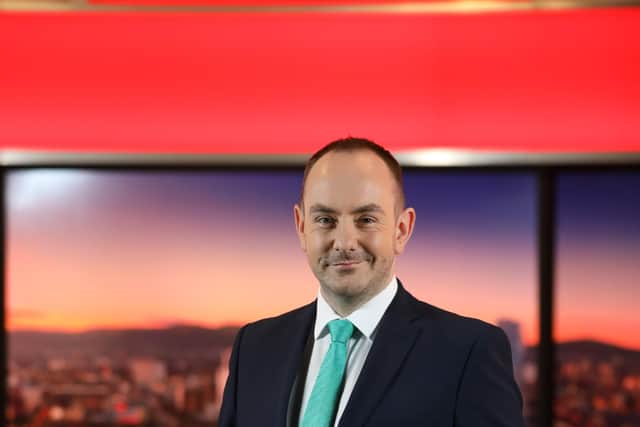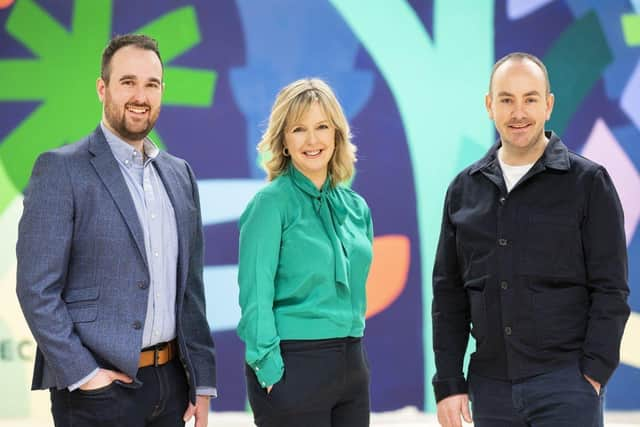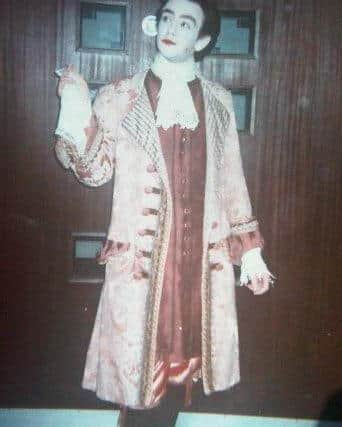BBC Newsline’s Declan Harvey: ‘I don’t think I’d be where I am today without my drama school training’
and live on Freeview channel 276
BBC NI broadcaster Declan Harvey, 38, has injured his foot and arrives to our interview hobbling on crutches, generously passed on by presenting partner Tara Mills.
In a few hours’ time, the trained actor, who once appeared on The Bill, will be on air presenting Newsline, so he will dispense with the crutches, act like nothing’s wrong, and the show, as they say, will go on.
Advertisement
Hide AdAdvertisement
Hide AdFormer Newsnight chief inquisitor and University Challenge host, Jeremy Paxman, once famously asserted that “any fool” can read the news because the work requires no “grandeur or skill”.


It’s a slight swiftly dismissed by Declan, who has recently taken up a prestigious new role presenting BBC Newsline.
“That’s not how it feels to me,” says the Co Donegal man.
“On BBC Newsline there are six parts of my brain working constantly. It’s about finding your spot, finding your light, reading, reading in a way that sounds like you’re not reading, making sure what you are reading is journalistically sound, listening to the three voices in your ear and pre-empting what’s coming next, all the while trying to stand up straight and not look like your slouching.
“What he (Paxman) is underestimating is the enormous responsibility you have not to let the people around you down. There are a team of editors, producers, graphic designers, reporters and researchers and they have all worked really hard to get the programme to the point of on-air. To approach it in a flippant way risks being disrespectful to the those you work with. When I am on the screen, there’s an army behind me.”


Evening Extra work
Advertisement
Hide AdAdvertisement
Hide AdHe may be a ‘newish’ face on our screens, but Declan has been presenting Evening Extra, BBC Radio Ulster’s drivetime news programme, alongside Tara Mills since April 2020, and now that he’s on TV he’s getting recognised more when he’s out and about.
“Radio is different, people get to know your voice, but TV is a game changer in that a lot more people spot you. I tend not to spot people spotting me, but people I am with will spot people spotting me,” he laughs.
“That is something I am learning to deal with, because I still find it quite awkward. The odd time people come up and chat and they are really lovely.”


But it’s clear that Declan, who lives in Belfast with his partner, Ciaran, is relishing his new role, and can’t quite believe his good fortune.
Advertisement
Hide AdAdvertisement
Hide Ad“BBC Newsline has been an absolute delight for the last month. The 6.30 news is the most watched or listened to programme on BBC 1 in Northern Ireland. You feel responsibility for that. I am trying very hard not to let the moment pass me by without being appreciative of what I am doing and where I am at.
“I walked passed Broadcasting House in Belfast enough times thinking it would be great to work in there some day and now to be fronting Newsline along with Tara, is amazing.”
Declan joined BBC Northern Ireland five years ago after working as a news journalist for BBC Radio 1’s Newsbeat.
“I’ve never considered myself a hard-nosed journalist. My passion is much more to do with communication and story-telling and whatever the story is, it’s about making sure people understand it. I am very interested in people and why people do things. I think I have a natural sense of empathy and I think that is the basis of where my journalism comes from, trying to understand what the person at the heart of the story is going through.”
Advertisement
Hide AdAdvertisement
Hide AdHe reflects, for a minute, then adds with a chuckle: “Maybe I am nosey. Being a journalist gives you a good excuse, because there are questions you can ask someone when you are on radio or television that you could never really get away with asking them in real life.”
Two different disciplines
Does he prefer TV or radio? “The radio is much more cut and thrust, it’s much faster, the day is much busier, you have to be more reactive, you have to be across the stories as they break on air, you are using less scripts. Sometimes you are really flying by the seat of your pants. We were on air about a minute into our programme when Arlene Foster resigned and then suddenly the whole thing had to change.
“TV is much more structured and it appeals much more to the actor in me as well. The studio is not dissimilar to a theatre, there are lights and sound and you are finding your mark and communicating with an audience using your whole body, and television, by necessity, has to be much more tightly designed and timed.
“I don’t think I would be where I am without drama school training, there’s no question. That training gave me three years to really consider words, the impact they have, how you say them, the pitch, the rhythm. I know how to handle nerves, so I don’t get distracted by them often. The only thing I would be nervous about is not squeezing enough juice out of the story and leaving something behind.”
Big news stories
Advertisement
Hide AdAdvertisement
Hide AdThe last couple of years have certainly had their fair share of big news stories.
“It’s been pretty intensive. After Brexit we had Covid and now there is a war. It’s exhausting, and I don’t mean that from just a news point of view - I think society is exhausted.
“There’s so much big stuff happening and then there’s also the cost of living crisis. It is devastating for families. I don’t have kids, so I am spared pressures that very many families aren’t. That (the cost of living) is just as worrying for many people as missiles in Ukraine. These are strange times.”
Declan worries about his friend James, who is currently working for the BBC in Kiev.
Advertisement
Hide AdAdvertisement
Hide Ad“It is a tough place to be at the minute and there’s only so much protection the BBC can give you, especially in a war zone.”
Would he considering taking in a family under the government’s Ukraine family scheme?
“Who among us hasn’t considered it? Everyone, like in my house, must have had a conversation about it. But many people will find that practical ties get in the way and it’s just not possible. People are incredibly kind and do what they can to help.”
The BBC has come in for a lot of flak recently, not least from the aforementioned Paxman, about the high salaries paid to some of it’s presenters.
Advertisement
Hide AdAdvertisement
Hide Ad“Its incumbent on the BBC to be able to justify what it is paying anybody - that goes for the lowest paid as well as the highest paid in the organisation,” says Declan.
“At a time of crisis, whether its Covid, or it’s Ukraine, people come to the BBC. Our viewer figures, our listenership figures, skyrocket. If people aren’t convinced of the merit of the BBC over the last couple of years, they never will be.
“At the height of the Covid pandemic, BBC Newsline was on every night. To have never missed a programme was just remarkable.”
A message from the Editor:
Thank you for reading this story on our website. While I have your attention, I also have an important request to make of you.
Advertisement
Hide AdAdvertisement
Hide AdWith the coronavirus lockdown having a major impact on many of our advertisers - and consequently the revenue we receive - we are more reliant than ever on you taking out a digital subscription.
Subscribe to newsletter.co.uk and enjoy unlimited access to the best Northern Ireland and UK news and information online and on our app. With a digital subscription, you can read more than 5 articles, see fewer ads, enjoy faster load times, and get access to exclusive newsletters and content. Visit https://www.newsletter.co.uk/subscriptions now to sign up.
Our journalism costs money and we rely on advertising, print and digital revenues to help to support them. By supporting us, we are able to support you in providing trusted, fact-checked content for this website.
Ben Lowry
Editor